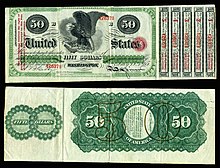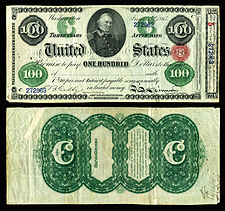Interest bearing note

Interest bearing notes refers to a grouping of Civil War era paper money-related emissions of the US Treasury. The grouping includes the one- and two-year notes authorized by the Act of March 3, 1863, which bore interest at five percent per annum, were a legal tender at face value, and were issued in denominations of $10, $20, $50, $100, $500 and $1000.[1] The grouping also frequently includes the early civil war treasury notes which matured in either sixty days or two years and bore interest at six percent and the seven-thirties which matured in three years and bore interest at 7.3 percent—though both of these latter issues lacked legal tender status.[2] Reference texts used by currency collectors will also sometimes include compound interest treasury notes and Refunding Certificates in this grouping as well.
Denominational set of interest bearing notes
[edit]Images are courtesy of the National Numismatic Collection at the National Museum of American History (Smithsonian Institution).
| Value | Terms | Year | Fr. | Image | Portrait/vignette[nb 1] | Population |
|---|---|---|---|---|---|---|
| $10 | One year (5%) | 1864 | Fr.196a | 
|
Salmon P. Chase (Charles Burt);[3] Eagle of the Capitol and Peace (James Bannister);[3] | 28 known[4] |
| $20 | One year (5%) | 1864 | Fr.197 | 
|
(?); Mortar firing (James Smillie);[5] Abraham Lincoln (Henry Gugler);[6] In God is our Trust | 9 known[4] |
| $50 | Two years (5%) | 1864 | Fr.203 | 
|
Caduceus (Alfred Jones);[7] Justice with Shield (Charles Burt);[8] America (?) | 7 known[9] |
| $100 | Two years (5%) | 1864 | Fr.204 | 
|
Farmer and Mechanic; ((Building)); In the Turret | 2 known[10] |
| $50 | Three years (7.3%) | 1865 | Fr.212d | 
|
Eagle and motto | 6 known (only 2 known with coupons)[11] |
| $100 | Three years (7.3%) | 1865 | Fr.212e | 
|
Winfield Scott | Unknown[12] |
| $1,000 | Three years (7.3%) | 1865 | Fr.212g counterfeit |

|
Justice with Shield (Charles Burt)[8] | |
| $1,000 | One year (5%) | 1863 | Fr.201 proof |

|
Justice; Liberty | |
| $1,000 | Two years (5%) | 1863 | Fr.206 proof |

|
Guerriere and Constitution; Discovery of the Mississippi by DeSoto | |
| $5,000 | One year (5%) | 1863 | Fr.202 proof |

|
The Altar of Liberty (Louis Delnoce) | |
| $5,000 | Three years (7.3%) | 1865 | Fr.212h proof |

|
Justice; New Ironsides (James Smillie) |
Footnotes
[edit]- ^ Names in parentheses are artists who engraved the portraits or vignettes used on the notes.
Notes
[edit]- ^ Hessler, Gene and Chambliss, Carlson (2006). The Comprehensive Catalog of U.S. Paper Money, 7th edition, Port Clinton, Ohio: BNR Press ISBN 0-931960-66-5.
- ^ Major marketers of rare currency notes make this grouping choice in their on-line sites.
- ^ a b Hessler, 2004, p. 65.
- ^ a b Friedberg & Friedberg, 2010, p. 63.
- ^ Hessler, 1993, p. 286.
- ^ Hessler, 1993, p. 145.
- ^ Hessler, 1993, p. 180.
- ^ a b Hessler, 1993, p. 73.
- ^ "Heritage Auctions Archives". Heritage Auctions. Retrieved 16 June 2014.
- ^ "Heritage Auctions Archives". Heritage Auctions. Retrieved 16 June 2014.
- ^ "Heritage Auctions Archives". Heritage Auctions. Retrieved 16 June 2014.
- ^ Friedberg & Friedberg, 2010, p. 71.
References
[edit]- Friedberg, Arthur L.; Friedberg, Ira S. (2013). Paper Money of the United States: A Complete Illustrated Guide With Valuations (20th ed.). Coin & Currency Institute. ISBN 978-0-87184-520-7. Retrieved 14 February 2014.
- Hessler, Gene (1993). The Engraver's Line – An Encyclopedia of Paper Money & Postage Stamp Art. BNR Press. ISBN 0-931960-36-3.
- Hessler, Gene (2004). U.S. Essay, Proof and Specimen Notes (2 ed.). BNR Press. ISBN 0-931960-62-2.
